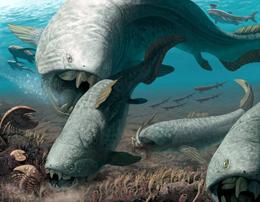Field work in Malo Jezero, Mljet Croatia
[Croatia Nov 10,2021]: Abiotic aragonite precipitates in the modern seawater-fed lake and provide an opportunity to understand how trace elements gets into the carbonate rock record.
from the Dahl group
[Croatia Nov 10,2021]: Abiotic aragonite precipitates in the modern seawater-fed lake and provide an opportunity to understand how trace elements gets into the carbonate rock record.
Danish Science journalist Lone Frank interviews Tais W. Dahl about his research. Her podcast series is called “24 Questions to the Professor” and runs in Danish. The podcast went from the formation of the Earth, through microbial evolution and into the world of animals and the colonization of land. What drove environmental evolution and Earth’s … Read More
On November 19, the Danish rapper Per Vers will orchestrate Science Slam in the Tycho Brahe Planetarium. The program is found here https://planetarium.dk/program/science-slam-faa-toptunet-din-viden-om-universet/. Tais will give a 7 minutes pitch from his research
The Section for Geobiology at GLOBE has helped organizing the spring season of EarthTalks 2021, and we welcome interested students and researchers to participate over Zoom (link below). The talks will not be recorded. Earth Talks Lecture Series – Spring 2021 Friday afternoons 14:00-15:00 DK time (sharp) 23/4 – Prof. Sigur∂ur Gislason, University of Iceland The … Read More
A discussion arises from the recent review article in Chemical Geology, where Tais W. Dahl and Susanne Arens concluded that land plants did not forever increase the physical weathering rates of the continental crust. This conclusion was reached from the records of preserved sediment rock volume and the timing of plant-assisted weathering as recorded in … Read More
The Carlsberg Foundation is sponsoring field work led by Tais W. Dahl to Arctic Siberia, where an important climate catastrophe is recorded in marine sedimentary rocks. The expedition will bring back data and samples deposited in the oceans during a climate event that caused sulfidic anoxia to suddenly expand in warming oceans and wipe out … Read More
In a brief story published in Danish on Videnskab.dk, Aske L. Sørensen and Tais W. Dahl explain one of the consequences of their latest EPSL paper: Earth was spinning faster 500 million years ago. The scientific paper entitled “Astronomically forced climate change in the Late Cambrian” documents Milankovitch-cycles in two drill cores through the Alum … Read More
The uranium isotope composition of seawater provide insights to how much sediment burial occurs globally in anoxia settings. Therefore, it is desirable to measure uranium isotopes to track the oxygenation state of the oceans through geological time. However, there is currently no geological archive that can reliably record the composition of ancient seawater. Calcitic brachiopods … Read More
May 21, 2020 The stable isotope fractionation of uranium in nature – unrelated to radioactive decay – has led to a profound tool for tracing O2 in the Earth’s oceans from the geological record. Feifei Zhang has gathered many of the leading researchers in the community to provide a summary of how uranium isotopes are … Read More

The colonization of land by plants, fungi and animals has had a profound impact on Earth’s climate and oxygenation state. In a comprehensive review paper, we have summarized the current state of knowledge and compiled available evidence in support that terrestrial life has caused: Atmospheric CO2 decline and climatic cooling (permanent transition) Atmospheric O2 rise … Read More